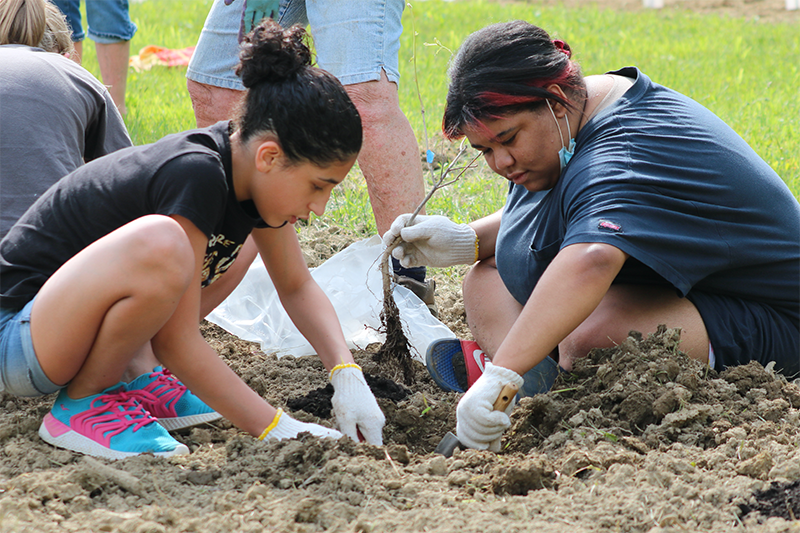April 17, 2022, Easter Sunday
Jacqueline Sanchez-Small OSB, Mount St. Benedict Monastery in Erie, PA

It’s too bad that the lectionary cuts today’s Gospel passage off after “they did not yet understand the Scripture that he had to rise from the dead.” By ending the story there, the narrative is centered on the interactions between Peter and John, instead of on the exchange between Mary Magdalene and the risen Christ that follows these verses. But breaking the story at that point also raises questions: Which characters in a story have we been taught to see as relatable or significant? Why are the stories of women so infrequently read from the ambo? And what do we miss when we get caught up in the kinds of patriarchal ways of relating to each other that Peter and John demonstrate?
In the section of John 20 that is excluded from the lectionary, Mary shows what can happen when, instead of getting caught up in the patriarchy’s competitions, power struggles, and need for certainty, we open ourselves to the transformative power of authentic encounter with God.


 One of the ways that I do lectio is by translating psalms. I love how reading them in Hebrew and writing a few different versions in English forces me to slow down and consider what each word means, what each line suggests. But, on occasion, my psalm translations are used for communal prayer, and when that happens, I always feel horribly self-conscious.
One of the ways that I do lectio is by translating psalms. I love how reading them in Hebrew and writing a few different versions in English forces me to slow down and consider what each word means, what each line suggests. But, on occasion, my psalm translations are used for communal prayer, and when that happens, I always feel horribly self-conscious. 
 March 27, 2022, Fourth Sunday of Lent
March 27, 2022, Fourth Sunday of Lent Some people told Jesus about the Galileans whose blood Pilate had mingled with the blood of their sacrifices. Jesus said to them in reply, “Do you think that because these Galileans suffered in this way they were greater sinners than all other Galileans? By no means! But I tell you, if you do not repent, you will all perish as they did! Or those eighteen people who were killed when the tower at Siloam fell on them— do you think they were more guilty than everyone else who lived in Jerusalem? By no means! But I tell you, if you do not repent, you will all perish as they did!”...
Some people told Jesus about the Galileans whose blood Pilate had mingled with the blood of their sacrifices. Jesus said to them in reply, “Do you think that because these Galileans suffered in this way they were greater sinners than all other Galileans? By no means! But I tell you, if you do not repent, you will all perish as they did! Or those eighteen people who were killed when the tower at Siloam fell on them— do you think they were more guilty than everyone else who lived in Jerusalem? By no means! But I tell you, if you do not repent, you will all perish as they did!”... A few weeks ago, I met a young Episcopal priest who was very interested in monasticism. She particularly wanted to understand its appeal for some spiritual “nones” who are leaving parishes like the one she serves.
A few weeks ago, I met a young Episcopal priest who was very interested in monasticism. She particularly wanted to understand its appeal for some spiritual “nones” who are leaving parishes like the one she serves.  March 6, 2022, First Sunday of Lent
March 6, 2022, First Sunday of Lent